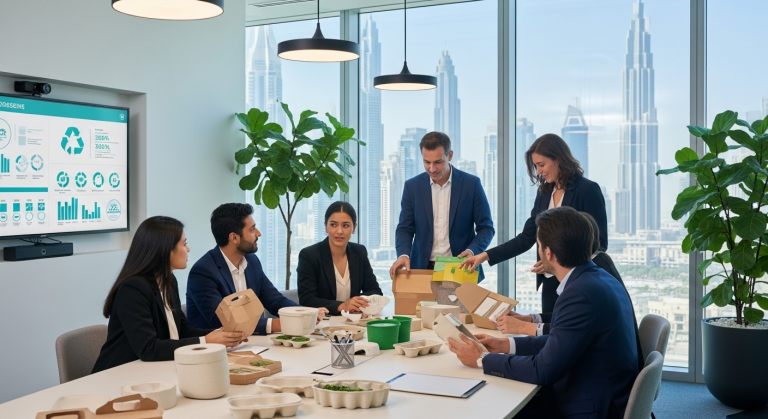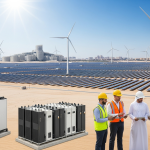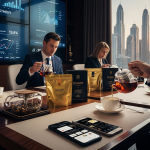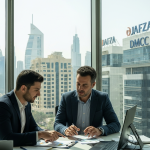Market Analysis and Opportunities
The demand for sustainable packaging solutions in the United Arab Emirates, particularly in thriving economic hubs like Dubai, has grown exponentially in recent years. Dubai’s strategic ambition to become a global leader in sustainability and green business—demonstrated by policies such as the Dubai Clean Energy Strategy 2050 and Vision 2030—has spurred both government and private sector entities to shift toward environmentally friendly practices. The sustainable packaging industry is positioned at the intersection of this transition, offering significant business opportunities in Dubai for entrepreneurs, investors, and business managers.
Target Market Analysis
- Market Size and Growth: According to Research and Markets, the Middle East & Africa sustainable packaging market is projected to reach USD 6.1 billion by 2025, with the UAE commanding a substantial share. Market growth is fueled by government initiatives, consumer demand, and the expanding e-commerce and food industries in Dubai.
- Consumer Preferences: Today’s consumers, especially in Dubai, demonstrate increasing environmental awareness, seeking out brands committed to eco-friendly products and packaging. Demand is highest in industries such as food & beverage, cosmetics, healthcare, and e-commerce, where packaging plays a critical branding role.
- Key Trends Shaping the Market:
- Digital transformation and automation in packaging processes.
- Rising adoption of recyclable, biodegradable, and compostable materials.
- Preference for minimalist, reusable designs aligned with customer sustainability values.
- Government-driven procurement policies requiring sustainable options for public sector contracts.
Marketing Needs
- A robust market research effort to map changing consumer preferences and competitor landscapes in Dubai.
- Digital-first strategies, including SEO, PPC, and targeted social media campaigns, to capture environmentally conscious audiences.
- Development of strong branding and purpose-driven communications tailored to the UAE’s multi-lingual market.
Investing in strategic digital marketing is essential. For example, leveraging local SEO tactics and paid ads can boost online visibility for sustainable packaging products among businesses in Dubai and consumers searching for green alternatives.
Expansion Potential
- Segment Diversification: Opportunity to expand from B2B (supplying businesses, manufacturers, and logistics companies) to B2C segments (retailers, direct-to-consumer brands).
- Geographic Reach: Potential to expand to other UAE emirates and the GCC region, taking advantage of regional commitments to sustainability.
- Export Potential: Dubai’s world-class logistics infrastructure makes it a powerful export hub for sustainable packaging exports to Africa, Asia, and Europe.
Comprehensive Business Overview
A Sustainable packaging solutions provider in Dubai offers eco-friendly, compliant, and cost-effective packaging alternatives to traditional plastic and non-recyclable materials. The business caters to companies in FMCG, retail, e-commerce, hospitality, and healthcare, providing them with custom or ready-made sustainable packaging options, including paper, bioplastics, and plant-based solutions.
- Industry: Green packaging manufacturing, distribution, and consulting.
- Business Model: Hybrid B2B/B2C; includes direct manufacturing, sourcing, and value-added consultation services for sustainable packaging compliance and design.
- Target Audience: Enterprises across food & beverage, retail, healthcare, e-commerce, hospitality sectors, and environmentally-driven individual consumers.
- Operational Scope: Focused on Dubai with capacity to service wider UAE and GCC markets; flexible to supply both local and export demand.
Mission, Vision & Core Objectives
- Mission: To lead the transformation of the UAE’s packaging industry by delivering innovative, sustainable solutions that reduce environmental impact and add business value.
- Vision: Becoming the leading regional provider of green packaging solutions and a catalyst for the UAE’s transition to a circular economy.
- Core Objectives:
- Offer high-quality, cost-competitive sustainable packaging to businesses and consumers.
- Continuously invest in R&D for materials innovation and product design.
- Build strong partnerships with government, NGOs, and industry leaders.
- Raise awareness for sustainable practices among clients and the public.
Business Stage and Location
- Stage: Ideally positioned at startup or early growth, with agile scalability for future expansion.
- Location: Dubai Free Zone is highly recommended for ease of setup, tax advantages, 100% foreign ownership, and world-class operational infrastructure. Consideration can also be given to mainland or offshore options depending on trading needs.
Competitive Advantage
Establishing a sustainable packaging solutions provider in Dubai offers a strong competitive edge from multiple perspectives:
Entrepreneur: Business Viability
- Dubai’s ambitious sustainability goals translate into favorable policies, subsidies, and funding opportunities for green startups.
- Powerful first-mover advantage in an emerging segment with limited direct competition, especially for locally manufactured biodegradable packaging.
- Ability to leverage Dubai’s business setup ecosystem—see Business Setup Services—to streamline launch and expansion.
Investor: Investment Attractiveness
- Rapidly growing demand, strong government backing, and societal pressure ensure long-term market viability and attractive ROI in Dubai.
- Scalability: Robust logistics network and Free Zones allow for swift regional and global expansion of sustainable packaging distribution.
- High exit potential through strategic sale to larger players, or IPO as UAE’s green economy matures.
Manager: Operational and Strategic Strengths
- Access to advanced manufacturing technology and automation systems for quality control and cost efficiency.
- Partnership opportunities with local businesses, raw material suppliers, and green technology firms enhance operational reliability.
- Strategic alliances with government and industry bodies position the business for preferential contract bidding.
For deeper insights on making your venture investment-ready, see Investment Consulting Services.
Financial and Investment Needs
Financial Requirements
- Startup Costs (typical estimates for Dubai):
- Company registration and licensing: AED 30,000–100,000, depending on Free Zone/mainland/offshore setup.
- Manufacturing equipment and technology: AED 300,000–1,000,000 for mid-scale operations.
- Research & Development: AED 100,000–250,000 annually for materials and product innovation.
- Staffing (first year): AED 400,000 (based on 8–12 staff including sales, operations, R&D).
- Marketing, branding, and digital campaigns: AED 150,000–300,000 per year.
- Ongoing Operational Costs: Rent, utilities, raw materials, logistics, and insurance.
Investment Potential
- ROI: Green businesses in Dubai often yield above-average returns due to government incentives and premium demand for eco-products.
- Scalability: Modular setup allows for phased investment and cost control.
- Investment Models: Equity and venture capital remain popular for startups; debt financing may suit growth stage or asset-heavy investment.
Financial Risks and Mitigation
- Risks:
- Cash flow shortfalls during early growth due to high CapEx and working capital needs.
- Market volatility (both local and export) and raw material price fluctuations.
- Regulatory changes affecting packaging standards or import/export controls.
- Mitigation Strategies:
- Diversifying client base and revenue streams (B2B and B2C).
- Investing in insurance and legal safeguards.
- Implementing flexible and lean production models to manage expenses.
Human Resources and Recruitment
Workforce Needs
- Core Roles: Operations managers, sales/business development executives, R&D/innovation specialists, marketing professionals, production staff.
- Type: Primarily permanent staff, with some roles (design, tech, marketing) potentially filled by specialized contract staff or consultants.
- Critical Skills: Sustainability expertise, materials science, supply chain management, digital marketing, and client relationship management.
HR Challenges
- Strong demand for skilled sustainability professionals and technical talent in Dubai’s competitive labor market.
- High labor and living costs may deter skilled expatriates.
- Retention pressures due to offers from large multinationals.
- HR Strategies:
- Competitive compensation, tailored expatriate packages, and attractive benefits (insurance, housing, bonuses).
- Continuous training and upskilling programs.
- Fostering an inclusive, purpose-driven company culture aligned with sustainability values.
Compliance with UAE Labor Laws
- Strict adherence to UAE labor regulations: employment contracts, visa sponsorship, work permits, and end-of-service benefits are mandatory.
- Recommended: Partner with a local HR specialist or PRO service to ensure legal compliance and efficient processing.
Infrastructure and Operations
Infrastructure Needs
- Physical Spaces: Manufacturing plant or warehouse (if producing), or co-working spaces (if initially focused on sales and consulting).
- Technology: ERP systems for inventory of packaging materials, CRM for client management, and cloud-based collaboration tools.
- Cost-Effective Solutions: Starting in a Dubai Free Zone offers lower overhead and easy scalability.
Operational Optimization
- Potential Weaknesses:
- Fragmented supply chains can cause delays and increased costs.
- Lack of automation or outdated production processes.
- Actionable Improvements:
- Investment in ERP, inventory, and logistics management systems.
- Automate production lines where feasible to improve efficiency and consistency.
- Lean process management to minimize waste and reduce lead times.
Legal Compliance
- Company Registration: Must select the right jurisdiction (Free Zone/Mainland/Offshore) and obtain necessary licenses for trading and manufacturing sustainable goods.
- Corporate Bank Accounts: Required for operational transactions; compliance with UAE Central Bank KYC norms is essential.
- Regulatory Alignment: Ongoing monitoring for changes in local packaging, trade, and environmental policies.
For detailed regulatory guidance and corporate setup, refer to Business Setup Services.
Innovation and Technology
- Leverage emerging technologies such as smart packaging (RFID for tracking), biodegradable material science, and digitized factory management (IoT sensors).
- Implement digital client portals for seamless B2B order management and customer service.
Marketing and Branding Strategies
Brand Status
- Strengths: Clear eco-friendly positioning resonates with Dubai’s progressive, sustainability-driven market.
- Opportunities: Invest in professional branding (logo, website, case studies) to strengthen reputation and promote trust for long-term B2B contracts.
Marketing Channels
- Prioritize digital channels for reach and cost efficiency: SEO-optimized website, active presence on LinkedIn and Instagram, and local online directories.
- Traditional methods (print, trade shows, partnerships with Dubai Chamber of Commerce) help tap established business networks.
- Utilize platforms for targeted ad campaigns and content marketing—see Sales and Advertising Services.
360-Degree Campaigns
- Integrated campaigns combining social media, email newsletters, content marketing (sustainability tips, customer stories), and participation in local green expos or industry panels.
- Incentivize clients through eco-friendly rewards programs, loyalty discounts, and partnership offers.
Growth and Development Potential
Growth Strategies
- Expand into niche market segments (e.g., sustainable packaging for luxury retail, organic food, or pharmaceutical sectors).
- Pursue R&D partnerships with universities or labs to innovate new materials.
- Build strategic alliances with logistics providers or international packaging distributors.
Networking
- Strengthen ties with public sector (government RFPs for green procurement), trade associations, and local startup ecosystems.
- Leverage connecting platforms like Persian Horizon for introductions, expansion resources, and multi-country access.
International Potential
- Dubai serves as a natural re-export hub for sustainable packaging, given proximity to Africa and Asia, strong trade networks, and logistical support.
- Compliance with international eco-standards facilitates entry into the EU, GCC, and APAC regions.
Sustainability and Innovation
- Focus on green certifications (e.g., ISO 14001), lifecycle analysis, and closed-loop packaging solutions.
- Align with Dubai’s Vision 2030 by implementing zero-waste policies and adopting advanced digital manufacturing technologies.
Alignment with Dubai’s Market
Cultural Alignment
- Multicultural teams and multilingual marketing ensure that offerings resonate with both local Emiratis and Dubai’s large expat population.
- Customization of packaging design and communications for various religious, cultural, and commercial contexts.
Local Regulatory Compliance
- Thorough due diligence and close adherence to UAE’s environmental, commercial, and tax laws.
- Periodic legal audits and local partnerships help avoid regulatory pitfalls.
Advantages of Dubai
- Tax-free business environment and low import duties in Free Zones encourage foreign investment.
- Ready access to global markets via ports, airports, and logistics providers.
- High local demand due to government procurement and sustainability mandates.
Local Challenges and Solutions
- High Competition: Focus on customization, service excellence, and innovation to differentiate from established suppliers.
- Operational Costs: Operate lean and leverage outsourcing, automation, and shared facilities to control expenses.
- Changing Regulation: Build strong relationships with regulators and monitor industry best practices.
Conclusion and Recommendations
The market analysis in Dubai highlights immense opportunity for a sustainable packaging solutions provider to thrive. Backed by government support, growing consumer demand, and rapidly expanding industries—for example, e-commerce and hospitality—Dubai presents fertile ground for entrepreneurs and investors pursuing green ventures. Dubai business opportunities in sustainable packaging transcend local demand, positioning the provider as a regional and global leader through innovation and strategic execution.
- Entrepreneurs should focus on agile market entry, robust partnerships, and early investment in technology and branding.
- Investors can expect strong long-term ROI, especially from businesses that innovate and scale rapidly to serve the GCC and beyond.
- Managers should prioritize digital transformation, operational efficiency, and employee engagement to build resilience and maintain competitive edge.
For assistance with business setup in Dubai or to explore tailored investment consulting, connect with Persian Horizon—your gateway to launching, scaling, and thriving in the UAE’s green economy. Stay updated with the latest insights on the Persian Horizon Blog.







